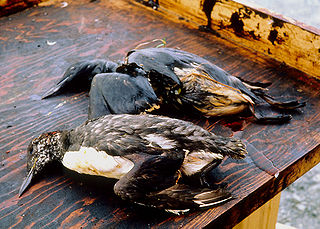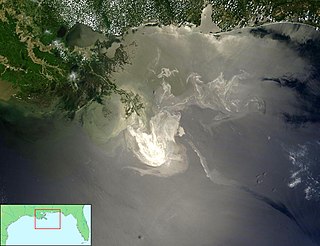
An oil spill is the release of a liquid petroleum hydrocarbon into the environment, especially the marine ecosystem, due to human activity, and is a form of pollution. The term is usually given to marine oil spills, where oil is released into the ocean or coastal waters, but spills may also occur on land. Oil spills may be due to releases of crude oil from tankers, offshore platforms, drilling rigs and wells, as well as spills of refined petroleum products and their by-products, heavier fuels used by large ships such as bunker fuel, or the spill of any oily refuse or waste oil.

An environmental disaster or ecological disaster is defined as a catastrophic event regarding the natural environment that is due to human activity. This point distinguishes environmental disasters from other disturbances such as natural disasters and intentional acts of war such as nuclear bombings.

The Jiyeh Power Station oil spill is an environmental disaster caused by the release of heavy fuel oil into the eastern Mediterranean after storage tanks at the thermal power station in Jiyeh, Lebanon, 30 km (19 mi) south of Beirut, were bombed by the Israeli Air force on July 14 and July 15, 2006 during the 2006 Israel-Lebanon conflict. The plant's damaged tanks leaked up to 30,000 tonnes of oil into the eastern Mediterranean Sea, A 10 km wide oil slick covered 170 km of coastline, and threatened Turkey and Cyprus. The slick killed fish, threatened the habitat of endangered green sea turtles, and potentially increased the risk of cancer.

On August 11, 2006, an oil spill occurred in Panay Gulf when the oil tanker, MT Solar 1, sank off the coasts of Guimaras and Negros in the Philippines, causing what is considered to be the worst oil spill in the country's history.

The Prestige oil spill occurred off the coast of Galicia, Spain in November 2002, caused by the sinking of the 26-year-old, structurally deficient oil tanker MV Prestige, carrying 77,000 tonnes of heavy fuel oil. During a storm, it burst a tank on 13 November, and French, Spanish, and Portuguese governments refused to allow the ship to dock. The vessel subsequently sank on 19 November, about 210 kilometres (130 mi) from the coast of Galicia. It is estimated that it spilled 60,000 tonnes or a volume of 67,000 m3 (17.8 million US gal) of heavy fuel oil.

The Houthi movement, officially known as Ansar Allah, is a Shia Islamist political and military organization that emerged from Yemen in the 1990s. It is predominantly made up of Zaidi Shias, with their namesake leadership being drawn largely from the Houthi tribe.

The 2009 southeast Queensland oil spill occurred off the coast of southeast Queensland, Australia on 11 March 2009, when 230 tonnes of fuel oil, 30 tonnes of other fuel and 31 shipping containers containing 620 tonnes of ammonium nitrate spilled into the Coral Sea, north of Moreton Bay during Cyclone Hamish. It happened after unsecured cargo on MV Pacific Adventurer damaged other cargo, causing the spillage. Over the following days, the spill washed ashore along 60 kilometres (37 mi) of coastline encompassing the Sunshine Coast, Moreton Bay, Bribie Island and Moreton Island.

The Deepwater Horizon oil spill was an environmental disaster which began on April 20, 2010, off the coast of the United States in the Gulf of Mexico on the BP-operated Macondo Prospect, considered the largest marine oil spill in the history of the petroleum industry and estimated to be 8 to 31 percent larger in volume than the previous largest, the Ixtoc I oil spill, also in the Gulf of Mexico. Caused in the aftermath of a blowout and explosion on the Deepwater Horizon oil platform, the United States federal government estimated the total discharge at 4.9 MMbbl. After several failed efforts to contain the flow, the well was declared sealed on 19 September 2010. Reports in early 2012 indicated that the well site was still leaking. The Deepwater Horizon oil spill is regarded as one of the largest environmental disasters in world history.
The Torrey Canyon oil spill was one of the world's most serious oil spills. The supertanker SS Torrey Canyon ran aground on rocks off the south-west coast of the United Kingdom in 1967, spilling an estimated 25–36 million gallons of crude oil. Attempts to mitigate the damage included the bombing of the wreck by aircraft from the Royal Navy and Royal Air Force. Hundreds of miles of coastline in Britain, France, Guernsey, and Spain were affected by the oil and other substances used to mitigate damage. It was the world's worst oil spill and led to significant changes in maritime law and oil spill responses.
The Sanchioil tanker collision occurred on 6 January 2018 when the Panamanian-flagged, Iranian-owned tanker Sanchi, with a full natural-gas condensate cargo of 136,000 tonnes, sailing from Iran to South Korea, collided with the Hong Kong-flagged cargo ship CF Crystal 160 nautical miles (300 km) off Shanghai, China. Sanchi caught fire shortly after the collision; after burning and drifting for over a week, it sank on 14 January.
FSO Safer is a floating oil storage and offloading vessel that is moored in the Red Sea north of the Yemeni city of Al Hudaydah.

The 2021 Mediterranean oil spill was an ecological disaster which occurred in February 2021 along the Mediterranean coast of Israel and Lebanon. Starting on 16 February 2021, dozens to hundreds of tons of tar washed up on the beaches along a 160-kilometre (99 mi) stretch of Israel's coast from Rosh Hanikra to Ashkelon, following a heavy storm and unusually high waves. Tar deposits also heavily impacted the beaches in south Lebanon. European Sentinel satellite photos showed 12 apparent oil slicks at various distances from the shore between 11 and 13 February 2021 according to Greenpeace.
Events in the year 2023 in Yemen.

The Red Sea crisis is an ongoing military standoff that began on 19 October 2023, when the Iran-backed Houthi movement within Yemen launched a barrage of missiles and armed drones at Israel. The Houthis have staged multiple seizures of civilian-operated cargo ships sailing near the Yemeni coast, and have claimed any Israel-linked shipping as a target, although multiple vessels with no apparent link to Israel have also been attacked. Houthis said they will not stop until Israel ceases its war on Hamas. The crisis in the Red Sea is a part of a broader proxy war between the United States and Iran.
Events in the year 2024 in Yemen.
On 30 December 2023, Houthi forces in the Gulf of Aden attacked the Maersk commercial vessel Maersk Hangzhou. Early the next day, Houthis again attacked the Maersk Hangzhou, attempting to board the freighter. The Maersk Hangzhou made a distress signal, to which U.S. Navy forces of the aircraft carrier USS Dwight D. Eisenhower and destroyer USS Gravely responded. The U.S., along with Maersk security personnel aboard the ship, repelled the attack. The U.S. sank three Houthi vessels, killing ten Houthis. Maersk announced a 48-hour pause on shipping through the Red Sea following the incident.
These are timelines of the Red Sea crisis, which began on 19 October 2023.









